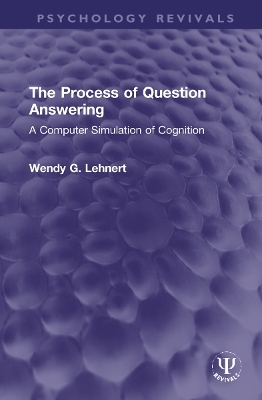
The Process of Question Answering
A Computer Simulation of Cognition
Seiten
2022
Routledge (Verlag)
978-1-032-32796-9 (ISBN)
Routledge (Verlag)
978-1-032-32796-9 (ISBN)
First published in 1978, this title examines a phenomenon that relies on many realms of human cognition: language comprehension, memory retrieval, and language generation. Problems in computational question answering assume a new perspective when question answering is viewed as a problem in natural language processing.
Originally published in 1978, The Process of Question Answering examines a phenomenon that relies on many realms of human cognition: language comprehension, memory retrieval, and language generation. Problems in computational question answering assume a new perspective when question answering is viewed as a problem in natural language processing. A theory of human question answering must necessarily entail a theory of human memory organization and theories of the cognitive processes that access and manipulate information in memory. This book describes question answering as a particular task in information processing. The theoretical models described here have been built on a formulation of general theories in natural language processing: theories about language that were developed without the specific problem of question answering in mind. By requiring programmers to be concerned with the precise form of information in memory, and the precise operations manipulating that information, they can uncover significant problems that would otherwise be overlooked. An early insight into artificial intelligence, today this reissue can be enjoyed in its historical context.
Originally published in 1978, The Process of Question Answering examines a phenomenon that relies on many realms of human cognition: language comprehension, memory retrieval, and language generation. Problems in computational question answering assume a new perspective when question answering is viewed as a problem in natural language processing. A theory of human question answering must necessarily entail a theory of human memory organization and theories of the cognitive processes that access and manipulate information in memory. This book describes question answering as a particular task in information processing. The theoretical models described here have been built on a formulation of general theories in natural language processing: theories about language that were developed without the specific problem of question answering in mind. By requiring programmers to be concerned with the precise form of information in memory, and the precise operations manipulating that information, they can uncover significant problems that would otherwise be overlooked. An early insight into artificial intelligence, today this reissue can be enjoyed in its historical context.
Preface. 1. Problems, Previews and Programs 2. Motivation and Background Part I: Interpretation: Understanding Questions 3. Conceptual Categories for Questions 4. Recategorizing Questions by Inferential Analysis Part II: Memory Searches: Finding an Answer 5. Content Specification 6. Searching Memory 7. Focus Establishment 8. Understanding What Did Not Happen 9. Finding the Best Answer 10. Conceptual Primitives for Physical Objects 11. More Problems 12. Perspective and Conclusions. References. Author Index. Subject Index.
| Erscheinungsdatum | 17.10.2022 |
|---|---|
| Reihe/Serie | Psychology Revivals |
| Verlagsort | London |
| Sprache | englisch |
| Maße | 156 x 234 mm |
| Gewicht | 620 g |
| Themenwelt | Geisteswissenschaften ► Psychologie ► Allgemeine Psychologie |
| Geisteswissenschaften ► Sprach- / Literaturwissenschaft ► Sprachwissenschaft | |
| ISBN-10 | 1-032-32796-0 / 1032327960 |
| ISBN-13 | 978-1-032-32796-9 / 9781032327969 |
| Zustand | Neuware |
| Informationen gemäß Produktsicherheitsverordnung (GPSR) | |
| Haben Sie eine Frage zum Produkt? |
Mehr entdecken
aus dem Bereich
aus dem Bereich
Buch | Softcover (2024)
Hogrefe Verlag
34,95 €


